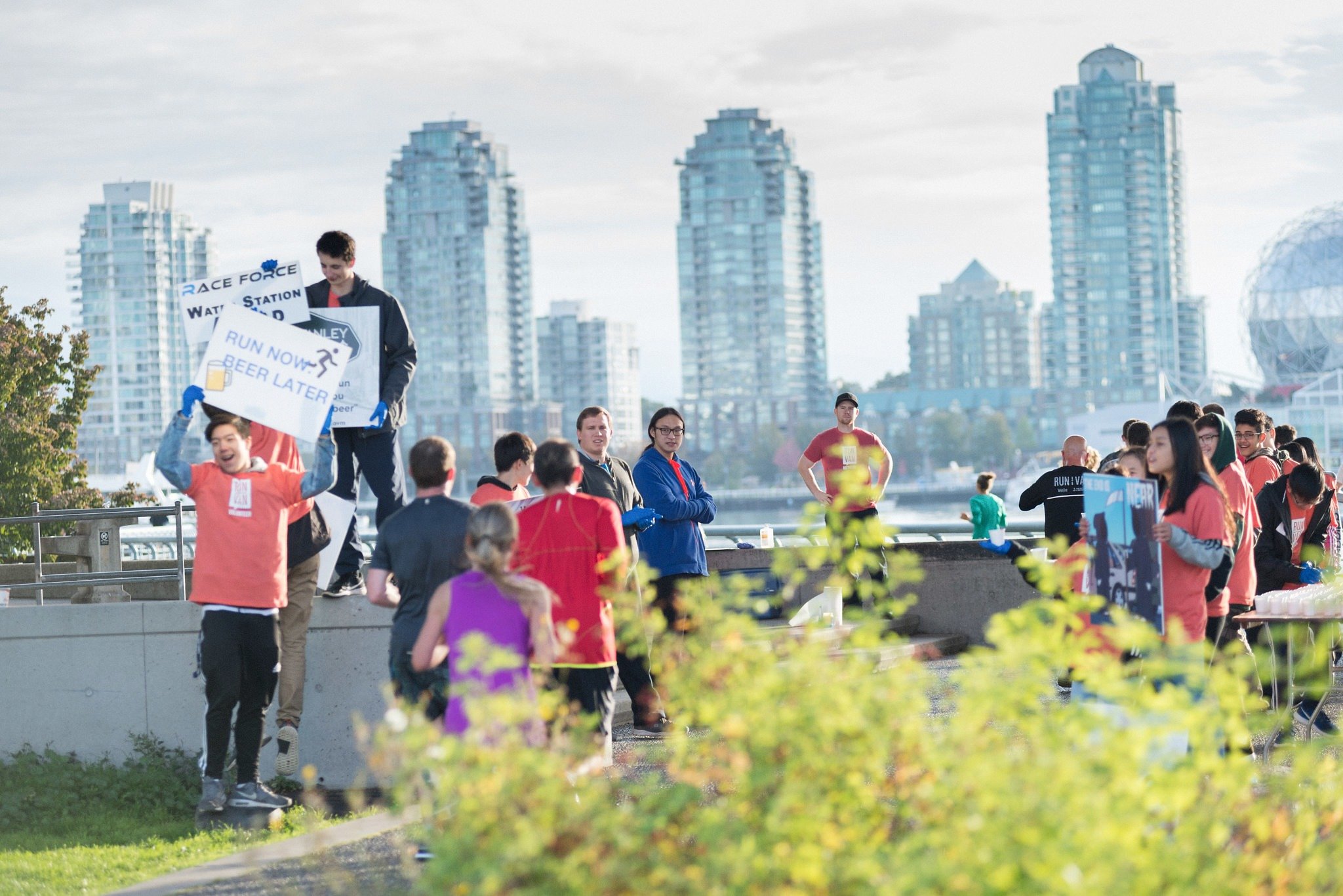Marathon
What is the average time for a Marathon?
The average time to complete a marathon varies, but it typically ranges between 4 to 5 hours. Experienced runners often finish faster, around 3 to 4 hours, while elite runners can complete marathons in under 2.5 to 3 hours. Individual goals and motivations influence finishing times, resulting in a wide range of times observed in marathons.
Check out the fastest marathon times
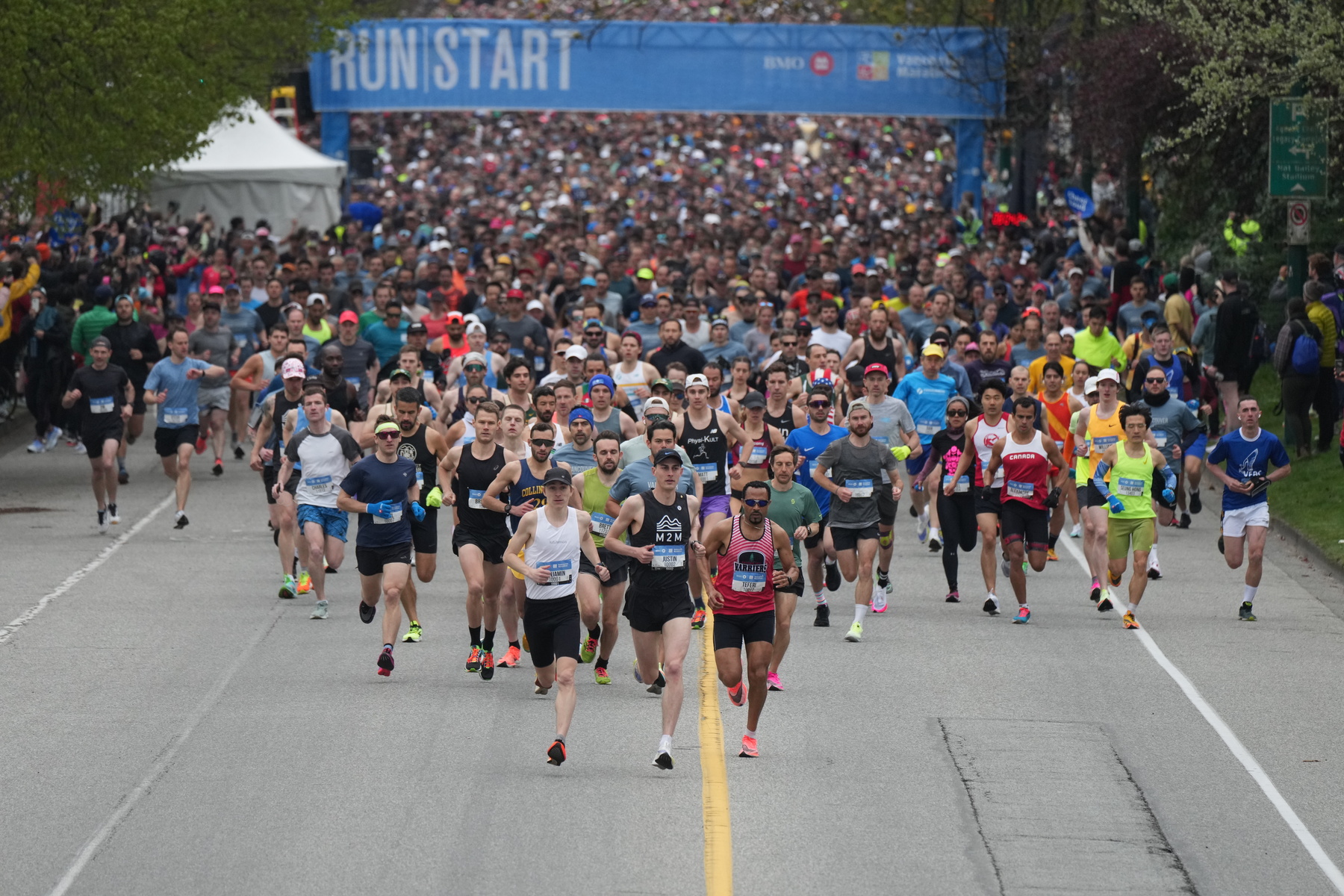
What is the distance of a marathon?
The distance of a marathon is 42.195 kilometers, which is approximately 26.2 miles. The marathon distance is derived from the historical legend of the Greek soldier Pheidippides, who is said to have run from the city of Marathon to Athens to deliver a message of victory during the Battle of Marathon. The modern marathon race has since become a widely recognized event in the world of endurance sports, testing the physical and mental limits of runners as they aim to complete the challenging 42.195-kilometer distance.
Where are the most popular destination races?
Some of the most popular destination marathons are held in various locations around the world, attracting participants from near and far.
According to Forbes Travel Guide, the top destination marathons in the world include the BMO Vancouver Marathon in May, Tokyo Marathon, Boston Marathon, and New York City Marathon.

Where are the Most Popular Marathons?
Some of the most popular Marathons globally are the Boston Marathon, London Marathon, Berlin Marathon, Tokyo Marathon, and New York City Marathon. The BMO Vancouver Marathon, held annually in May Vancouver, Canada, is also among the most popular marathons in the world and according to Forbes Travel Guide, the top destination marathons. The BMO Vancouver Marathon is a Boston Qualifier that takes runners on a 42.2KM (26.2 miles) adventure past beaches, through natural parks, and along Vancouver’s Seawall – the world’s longest uninterrupted waterfront path.
When is the Best Time to Race a Marathon?
The optimal condition for running a Marathon is clear skies and temperatures between 10ºC and 18ªC. Vancouver’s only marathon event is held annually on the first weekend of May. This is traditionally an ideal time to race in Vancouver, and has proven perfect conditions for running a Marathon or Half Marathon.
When should you start training for a Marathon?
If you’re thinking about running a Marathon, you may be wondering when to start your training. Beginner runners should give themselves at least 5 to 6 months to train for a full marathon. Starting your training well in advance will help to avoid injury and build up your endurance gradually. Ideally, you should start training for a Half Marathon or full marathon at least 16 to 20 weeks before the race. Read Tips on running your first marathon or see Running Room’s John Stanton 17 week training plan.
How long do I need to train for a marathon?
The amount of time required to prepare for a marathon varies depending on your fitness level and running experience. A typical training program runs 16-20 weeks consisting of 3-5 runs per week, including one long run, speed work, and tempo run. If you’re new to running you may want to spend additional time building your fitness base.
Why do people run marathons
People run marathons for a variety of reasons, including personal goals, physical fitness, mental health, and to build a sense of community. Runners also tackle marathons as a bucket list goal, to raise money and awareness charity, community, mental and emotional benefits and cardiovascular health. Runners can find community and develop strong friendships in run clubs. Marathons are extremely rewarding.
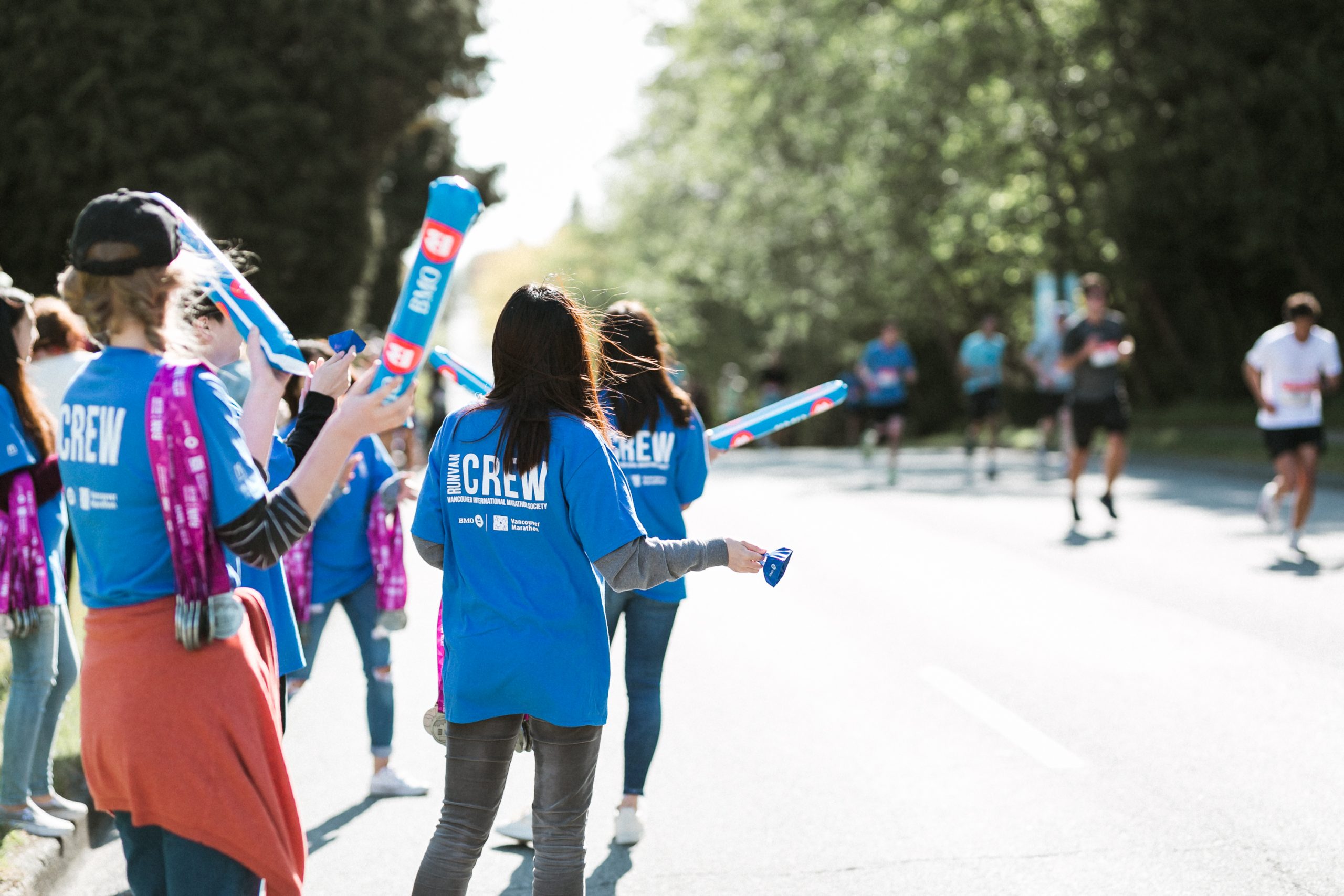
How long does it take to run a Marathon?
The time it takes to run a marathon can vary greatly depending on the individual. The average marathon finish time is around 4:30. Elite runners are pushing the two hour barrier, in 2019 Eliud Kipchoge became the first runner to break 2 hours, running 1:59:40 in Vienna. Regardless of the time it takes to finish a marathon, the accomplishment in itself is significant and should be taken with pride.
How do I run my first marathon?
Follow a marathon or half marathon training plan for a successful race day. Here is a sample 17-week training plan designed by Running Room founder, John Stanton.
How to train for a marathon?
Seven steps on how to train for a marathon:
- Build gradually: Start with a base fitness level and gradually increase your mileage and intensity over several weeks.
- Follow a training plan: You can use a sample 17-week training plan designed by Running Room founder, John Stanton.
- Cross-train: Incorporate other forms of exercise, such as cycling or swimming to strengthen your muscles and reduce the risk of injury.
- Incorporate races to your training plan: Adding shorter races, such as 5Ks or half marathons, into your marathon training plan as valuable opportunities to practice race-day strategies, gauge your fitness, and build confidence.
- Fuel your body: Proper nutrition is crucial for marathon training.
- Rest and recover: Rest is just as important as training. Make sure you are getting enough sleep, stretching, and taking rest days to allow your body to recover and rebuild.
- Stay motivated: Find a training partner or join a run crew to help you stay motivated and accountable. If you’re in the Vancouver area, join up with a local run crew.
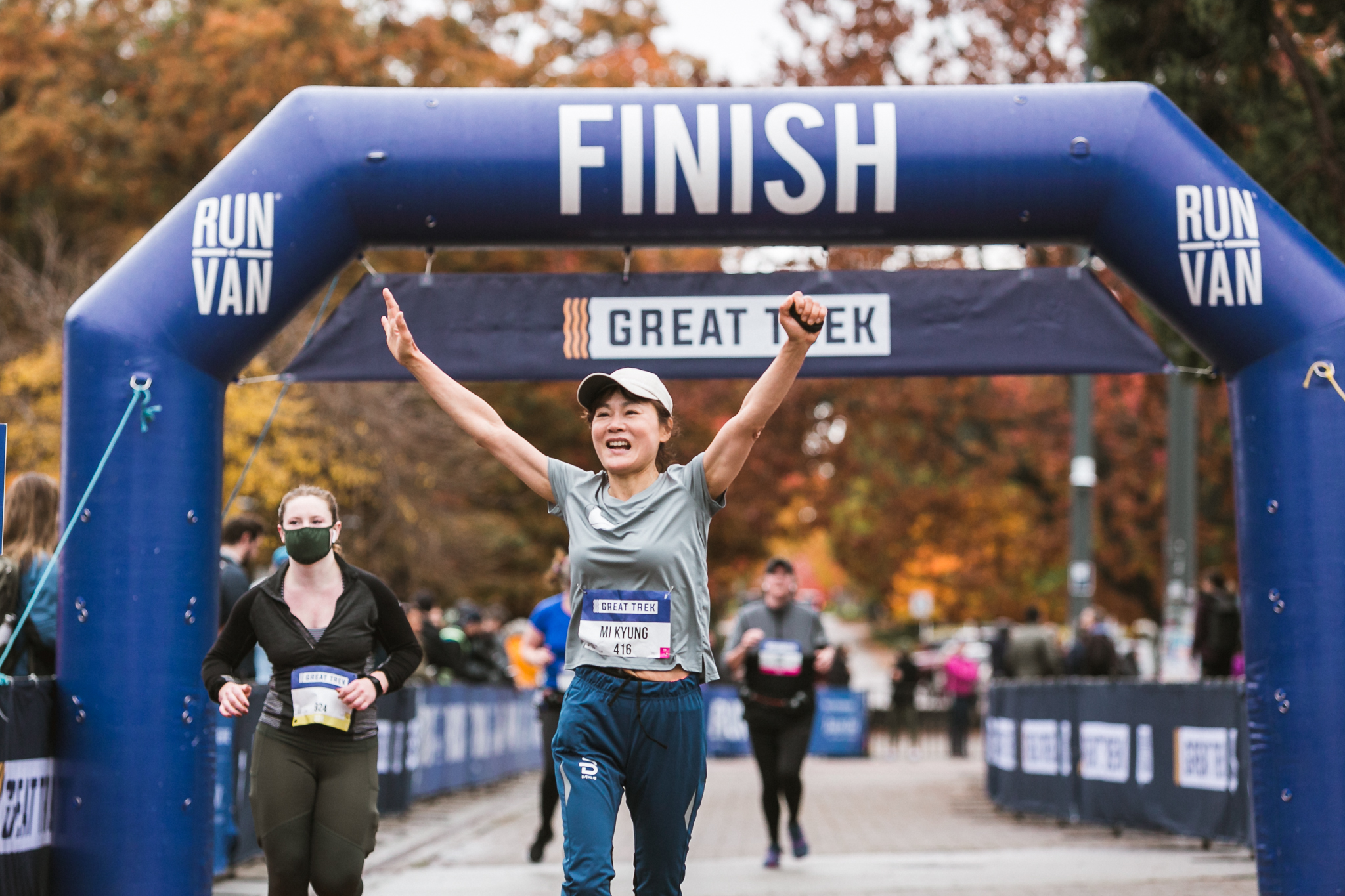
Can I run a Marathon as a beginner?
Yes, it is possible for a beginner to run a marathon. It is important to prepare and train properly to ensure you are adequatley prepared for the demands of a successful race.
If you are new to running, it is recommended that you spend several months building a base fitness level before beginning a marathon training program. This will involve gradually increasing your mileage and intensity over several weeks or months, starting with short runs and gradually increasing to longer runs. Include a practice races such as a 5K, 10K, or half marathon to gauge how you may want to adjust your training plan and goals. It’s important to follow a marathon training program designed for beginners and to work with a coach or experienced runner to help you develop a training plan that suits your goals, fitness level, and lifestyle.
Additionally, proper nutrition, hydration, and rest are crucial for marathon training, so make sure you are consuming enough calories, staying hydrated, and getting enough rest and recovery time. Running a marathon is a challenging goal, but with proper preparation, training, and dedication, it is achievable even for beginners.
Can I train for a Marathon in one month?
No, you can’t really train for a Marathon in one month unless you already have an amazing base. A successful marathon training plan typically spans between 16-20 weeks
6 Training tips for first-time marathon runners
How to conquer your first 42.2KM as a beginner
1. Gradual mileage increase: Gradually increase your weekly mileage to allow your body to adapt and reduce the risk of injury. Follow the 10% rule, increasing your mileage by no more than 10% each week.
2. Long runs: Incorporate long runs into your training plan to build endurance. Start with shorter distances and gradually increase the distance over time, simulating the marathon distance before race day.
3. Speed and interval training: Include speed and interval training sessions to improve your overall pace and running efficiency. Intervals, tempo runs, and fartlek workouts help develop speed, endurance, and mental toughness.
4. Cross-training and strength training: Engage in cross-training activities such as cycling, swimming, or strength training to enhance your overall fitness, prevent muscle imbalances, and reduce the risk of overuse injuries.
5. Sign up for shorter distance races: Participate in shorter distance races, such as 5K or 10K events, as part of your training. These races can serve as valuable practice opportunities, allowing you to experience race-day conditions, practice pacing, and build confidence leading up to the marathon.
6. Rest and recovery: Make rest and recovery a priority in your training plan. Allow your body time to rest and repair between workouts, incorporating rest days and easy recovery runs into your schedule.
Remember to approach your training with patience, stay consistent, and enjoy the process. Each training tip plays a crucial role in your overall preparation for the marathon. By incorporating these strategies into your training plan, including signing up for shorter races to gain valuable experience, you’ll be well-prepared to tackle the marathon distance on race day.
10 essential pieces of marathon advice
Tips to help you crush your next marathon
- Train properly: Follow a well-structured training plan that includes a gradual increase in mileage, long runs, speed workouts, and rest days. Consistency is key, so stick to your training schedule.
- Set realistic goals: Set achievable goals based on your current fitness level and experience. It’s better to start with a conservative goal and exceed it rather than setting an unrealistic goal and feeling disappointed.
- Fuel your body: Proper nutrition is crucial for marathon training. Eat a well-balanced diet that includes carbohydrates, protein, and healthy fats. Stay hydrated and fuel your long runs with energy gels or sports drinks to replenish electrolytes.
- Pace yourself: Avoid starting too fast on race day. Stick to a pace that is sustainable throughout the entire marathon. Starting too fast can lead to burnout and exhaustion later in the race.
- Dress appropriately: Wear comfortable, moisture-wicking clothing and proper running shoes that you’ve trained in. Avoid trying out new gear or clothing on race day to prevent discomfort or blisters.
- Don’t skip the taper: The taper period is the final phase of your training, where you gradually decrease your mileage to allow your body to recover and prepare for the race. Don’t skip this important phase as it helps you feel fresh and ready on race day.
- Mental preparation: Running a marathon is not just physically demanding but also mentally challenging. Visualize crossing the finish line, stay positive, and break the race into smaller, manageable segments to stay motivated.
- Join a run club or crew: Consider joining a local run club or crew for your training runs. Running with others can provide accountability, motivation, and support. You can learn from experienced runners, share tips and advice, and enjoy the camaraderie of fellow marathoners.
- Listen to your body: Pay attention to any signs of injury or fatigue during training and on race day. It’s better to take a short break or seek medical assistance if needed, rather than pushing through and risking further harm.
- Enjoy the experience: Remember that running a marathon is a significant achievement. Enjoy the journey, embrace the atmosphere of the race, and celebrate your accomplishment, regardless of your finishing time.
These tips are general guidelines, and it’s always a good idea to consult with a coach or experienced runners for personalized advice based on your specific needs and circumstances. Good luck with your marathon!
26 tips for running your best 26.2
- Start your training early and follow a structured training plan.
- Build up your mileage gradually to avoid injury and burnout.
- Incorporate strength training exercises to improve your running form and reduce the risk of injury.
- Practice good nutrition and hydration habits throughout your training.
- Focus on getting enough sleep and rest to help your body recover.
- Invest in a good pair of running shoes and make sure they’re broken in before race day.
- Experiment with different fuels and hydration methods during your long training runs to find what works best for you.
- Set realistic goals for your race, whether it’s to finish or to achieve a specific time.
- Practice mental toughness techniques to help you stay motivated and focused during the race. ie. Something as simple as running without listening to music.
- Make sure to taper properly in the weeks leading up to the race to allow your body to rest and recover.
- Have a race day plan, including pacing, nutrition, and hydration strategies. ie. Fuel every 45 minutes.
- Use a Garmin, GPS watch or other tracking device to monitor your pace and distance during the race.
- Take advantage of aid stations and fuel stations along the course to stay hydrated and fueled.
- Break the race down into smaller segments to make it feel more manageable.
- Use visualization techniques to mentally prepare for the race and visualize yourself crossing the finish line.
- Stay positive and focused during the race, even if you’re struggling.
- Make use of crowd support and cheering to keep you motivated.
- Incorporate shorter races such as 5Ks or half marathons into your marathon training plan to practice race-day strategies and gauge your fitness.
- Keep an eye on your running form and posture to prevent injury.
- Don’t start too fast – pace yourself for the long haul.
- Find a running buddy or group to train with for accountability and support.
- Celebrate small victories along the way to help you stay motivated. (Treat yourself to that Brooks running jacket you’ve been eyeing, you earned it!)
- Keep a positive attitude and stay grateful for the opportunity to run a marathon.
- Be prepared for unexpected weather conditions and adjust your plan accordingly.
- Stay focused on the present moment and avoid worrying about the miles ahead.
- Enjoy the experience – running a marathon is a major accomplishment, so make sure to savor the moment and be proud of yourself.
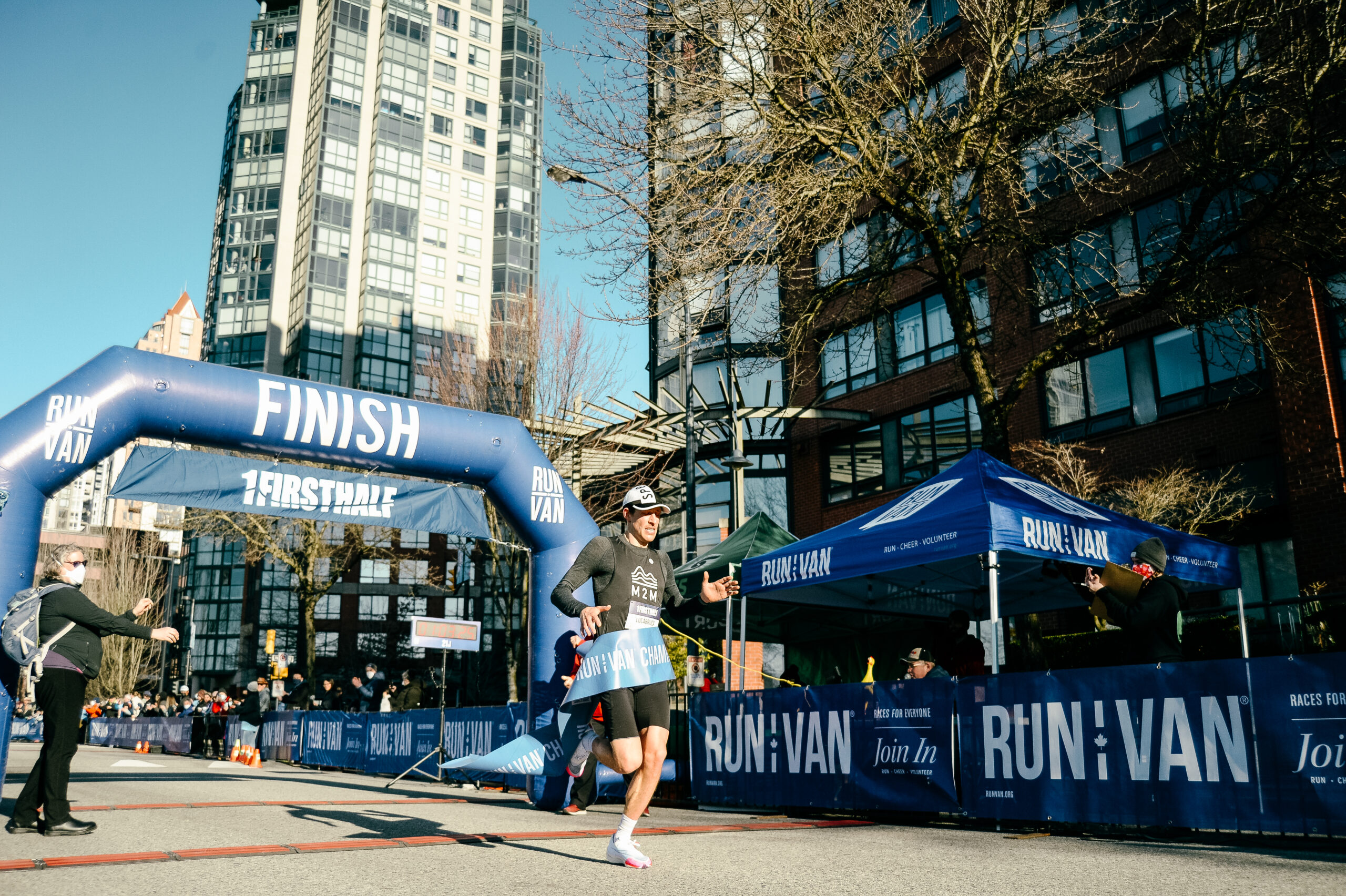
How to run a faster marathon
Essential Tips for a Speedy Marathon
Running a faster marathon is a common aspiration for many runners seeking to improve their race performance. With the right strategies and mindset, you can unlock your speed potential and achieve your best race yet. In this article, we’ll provide you with essential tips to optimize your training and race-day approach, helping you run faster and reach your goals in your upcoming marathon.
Train Smart and Consistently:
Follow a well-structured training plan that incorporates a mix of long runs, speed workouts, hill repeats, and recovery days to build endurance and improve overall race pace.
Set Realistic Goals:
Establish achievable goals based on your current fitness level and past race performances. Setting realistic targets will keep you focused and motivated throughout your training.
Incorporate Speed Workouts:
Include interval training, tempo runs, and fartlek sessions in your training routine to enhance your running economy and increase your lactate threshold.
Practice Hill Repeats:
Incorporate hill repeats into your training regimen to improve leg strength and power, which will translate to improved speed and endurance on flat terrain.
Optimize Nutrition:
Pay attention to your pre-race and race-day nutrition, fueling your body with the right balance of carbohydrates, proteins, and fats.
Hydrate Strategically:
Develop a hydration plan considering the weather conditions and your sweat rate, ensuring regular hydration during training runs and practicing aid station drinking techniques.
Mental Preparation:
Cultivate a positive and focused mindset through visualization techniques, mental imagery, and positive self-talk, building mental resilience for overcoming challenges during the race.
Pace Yourself:
Start the race conservatively and gradually increase your effort as you progress through the course, avoiding the temptation to go out too fast.
Utilize Race-Day Strategies:
Familiarize yourself with the race course, elevation profile, and aid station locations, planning your pacing strategy accordingly to take advantage of downhill sections and conserve energy during uphill segments.
Embrace Support:
Leverage the encouragement from family, friends, and spectators along the race route, boosting your morale and motivation during challenging moments.
By implementing these essential tips, including hill repeats, you’ll be well-prepared to run a faster marathon and achieve your best race performance. Remember to train consistently, set realistic goals, and optimize various aspects of your preparation. With determination and a focused approach, you’ll be on your way to reaching new levels of speed and accomplishing your marathon goals.
5 Tips to running your best marathon
- Establish a Well-Structured Training Plan: Develop a training plan tailored to your fitness level, goals, and available time. Include a combination of long runs, speed work, tempo runs, and recovery days. Gradually increase your mileage and intensity to build endurance and strength.
- Prioritize Consistency: Consistency is key to marathon training. Stick to your training schedule and make running a regular habit. Consistent training builds fitness, improves running economy, and helps you adapt to the demands of a marathon.
- Practice Proper Nutrition and Hydration: Fueling your body properly is crucial for marathon success. Learn about proper pre-race and on-course nutrition strategies. Experiment with different foods and hydration methods during training to find what works best for you. Stay well-hydrated throughout your training and on race day.
- Pace Yourself: Develop a race strategy and stick to your planned pace. Starting too fast can lead to exhaustion later in the race. Aim for negative splits, gradually increasing your pace as the race progresses. Know your target pace and use a GPS watch or timing splits to monitor your progress.
- Mental Preparation and Visualization: Prepare your mind for the challenges of the marathon. Visualize yourself crossing the finish line, imagine feeling strong and confident throughout the race. Break the distance into manageable segments and focus on one mile at a time. Develop positive affirmations and stay mentally strong during challenging moments.
Remember, every runner is unique, and what works for one person may not work for another. It’s essential to listen to your body, adapt your training as needed, and seek advice from experienced runners or coaches. Stay dedicated, trust your training, and enjoy the journey towards running your best marathon.
7 tips on qualifying for the boston marathon
Qualifying for the Boston Marathon is a significant goal for many runners. Here are seven tips to increase your chances of qualifying for this prestigious event:
- Understand the Qualifying Standards: Familiarize yourself with the Boston Marathon’s qualifying standards for your age and gender category. The standards can be found on the official Boston Athletic Association (BAA) website. Knowing the time you need to achieve will help you set a specific goal.
- Select a Boston Qualifier race: In order to qualify for Boston, a runner must run a certified marathon. Check the Boston Athletic Association (BAA) website for a list of certified races that can be used for Boston Marathon qualification. The BMO Vancouver Marathon is a Boston Qualifier race.
- Follow a Targeted Training Plan: Find a training plan that focuses on the specific goal of qualifying for the Boston Marathon. Look for plans that incorporate speed work, tempo runs, long runs, and recovery days to help you improve your speed and endurance.
- Consistency and Progression: Consistency is key in training for any goal, including Boston qualification. Build a solid base of mileage and gradually increase your training volume over time. Consistent training will help your body adapt and improve your overall fitness.
- Incorporate Speed Work: Integrate speed work, such as interval training, into your training plan. These workouts improve your running economy and help you build the speed necessary to achieve your qualifying time. Consult with a running coach or knowledgeable runner for guidance on effective speed work routines.
- Learn from Past Attempts: If you have previously attempted to qualify for Boston without success, analyze your past races. Identify areas for improvement, such as pacing, nutrition, or race strategy, and make adjustments accordingly. Learning from your experiences can help you make necessary changes and increase your chances of success.
RESOURCES
Training Tips, running advice + moreJoin in
VOLUNTEER
As a volunteer, you become an ambassador of RUNVAN®. You’ll help to provide a safe, fun and memorable experience for all runners, spectators and supporters. Please see event pages for specifics, and enjoy camaraderie with a great team!
